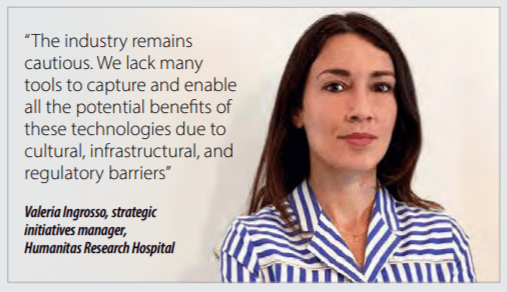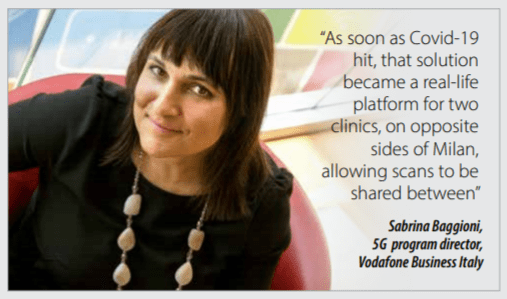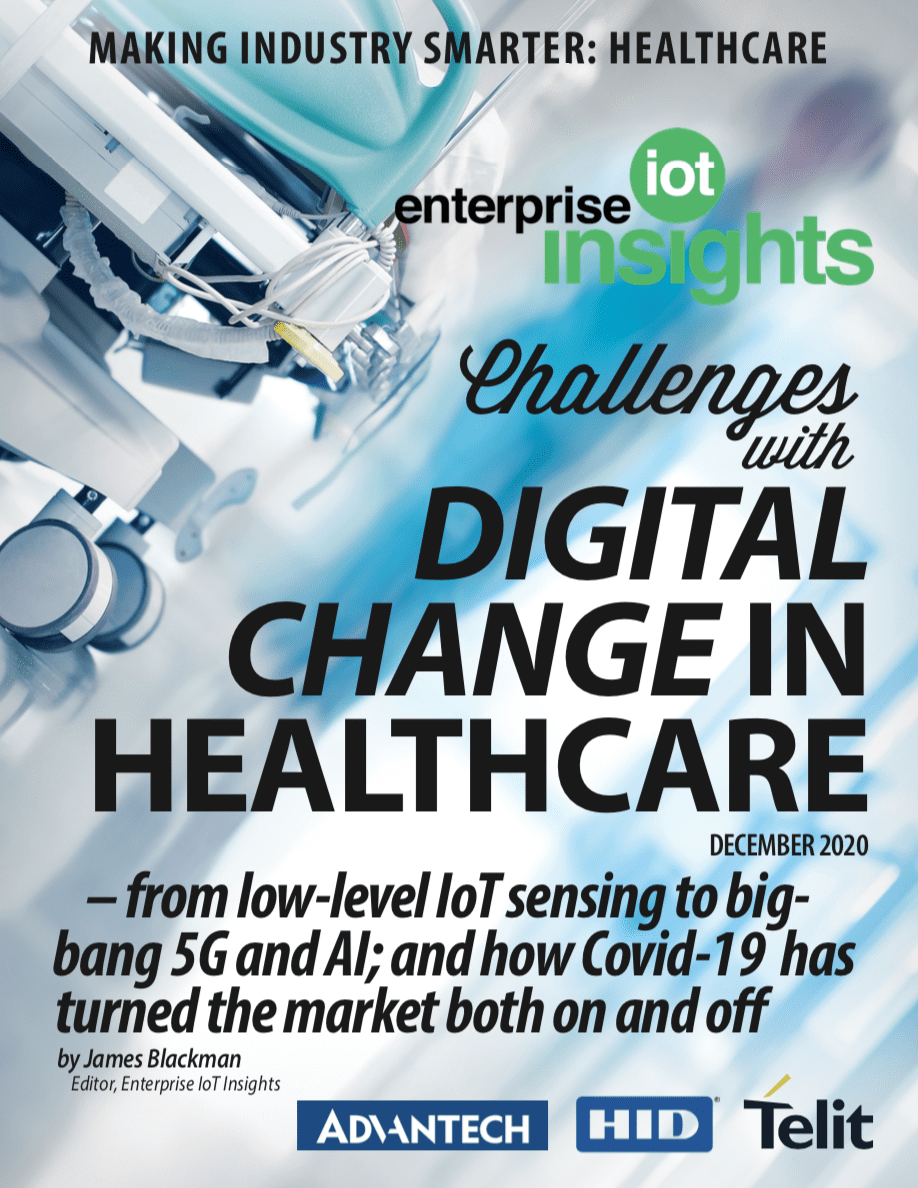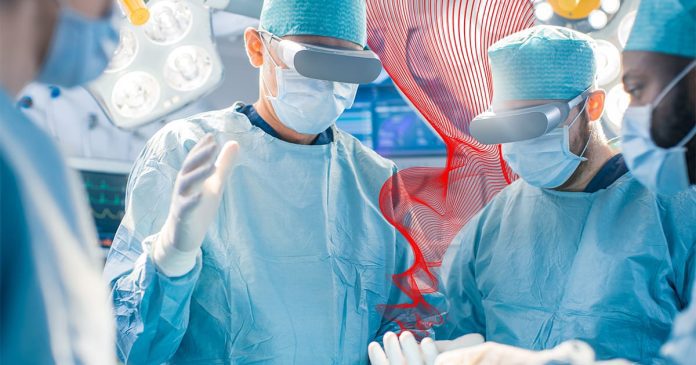Note, this article is taken from a new editorial report on the state of digital change in the healthcare sector (see image below). The report – Challenges with Digital Change in Healthcare – from low-level IoT sensing to big-bang 5G and AI, and how Covid-19 has turned the market both on and off – can be found here.
Vodafone has been experimenting for two years in Milan on potential applications for industrial 5G. An expanding part of its focus in the Italian city has been around healthcare, particularly as the coronavirus (Covid-19) pandemic has torn through the country in 2020.
It has been working with the Humanitas Research Hospital in two locations in Milan, and reckons the Covid-19 crisis has made clear the value that 5G-powered sensing and sense-making solutions can deliver for the healthcare market.
For the most part, the experiments focused on the hospital’s radiology department, and on the ability to more-easily share high-resolution scans between locations. However, the pair have also collaborated on wearable devices and medical equipment for remote care to monitor outpatients, and even touched on the futuristic topic of remote controlled surgery (page 9, also).
 The Milanese project uses a private 5G setup. The suggestion, from elsewhere, including stablemate Verizon in the US, is hospitals do not actually need private 5G in most cases. As an aside, Verizon’s work with Avesha Systems (pages 18-19), to run real-time computer analysis on live video streams over 5G during colonoscopy tests, uses the public network, plus multi-access edge compute (MEC) deployments with AWS.
The Milanese project uses a private 5G setup. The suggestion, from elsewhere, including stablemate Verizon in the US, is hospitals do not actually need private 5G in most cases. As an aside, Verizon’s work with Avesha Systems (pages 18-19), to run real-time computer analysis on live video streams over 5G during colonoscopy tests, uses the public network, plus multi-access edge compute (MEC) deployments with AWS.
Avesha Systems has the inference models reside in graphics processors at the edge, updated continuously in a cloud backend. The video runs between the hospital and the edge server over the 5G network, augmented with AI on its return.
For its part, Vodafone makes the same noise about MEC in its Milanese review. “5G is ideal for AI algorithms to process data close to the source using MEC. In a healthcare environment, this will offer workers a real-time, holistic analysis of the situation, allowing them to manage patients’ data much more effectively and quickly,” it says.
Below, we review the 5G testbed at the Humanitas Research Hospital, in conversation with Sabrina Baggioni, 5G program director for business at Vodafone Italy, and Valeria Ingrosso, strategic initiatives manager at Humanitas Research Hospital. On page 9, we profile four key use cases for private 5G in healthcare, as Vodafone has perceived them in Milan.
…
Has Covid-19 accelerated demand for IoT (and other technology) solutions? How?
Baggioni: ”Covid-19 made clear to businesses and public bodies, particularly in healthcare, that continuity of service has to be assured while operating remotely. Enabling smart workplaces, remote-access control, social distancing monitoring, remote patient care and radiology consultation became top priorities to guarantee operational continuity in the emergency.”
Has Covid-19 accelerated or delayed investment in new digital technologies – in hospitals and remote care?
Ingrosso: “It has definitely accelerated some investments in new digital technologies and also forced regulators to start thinking about how to integrate them into protocols and hospital flow. We were authorized to start implementing tele-medicine solutions and numerous grants were awarded at regional, national, and European level to foster the design of smart solutions.”
 Baggioni: “Covid-19 has made some business take a step back, rethink their plans and look to implement a more digital strategy. In healthcare, we have noticed an immediate understanding of how new technologies can support essential operations to manage emergencies, monitor in-hospital patients on a continuous basis, and provide care to remote patients.
Baggioni: “Covid-19 has made some business take a step back, rethink their plans and look to implement a more digital strategy. In healthcare, we have noticed an immediate understanding of how new technologies can support essential operations to manage emergencies, monitor in-hospital patients on a continuous basis, and provide care to remote patients.
“As an example, a medical remote consulting platform for radiology had been developed and implemented during the 5G trial in Milan in collaboration with Humanitas and Exprivia-Italtel. As soon as Covid-19 hit, that solution became a real-life operational platform for two clinics on opposite sides of Milan to share high-definition video and radiological images between them.
“They could share details of clinical exams as they were being performed, with immediate improvement in quality and efficiency, and without the need for doctors, patients, and families to travel more than strictly needed during the lockdown period.”
How is Humanitas Research Hospital using IoT technologies, such as sensor devices for tracking equipment and people, perimeter access controls, and track-and-trace solutions?
Ingrosso: “We are mainly trying to use sensor devices for tracking people at home, but we are still in a pilot phase.”
How important is remote care in the ‘new normal’, and how important is technology like sensors, wearables, cameras, and smartphones?
Ingrosso: “Remote care is key for sustainable healthcare. Covid-19 made clear how much pressure can be avoided if patients are accurately monitored remotely. This is possible today with an appropriate use of existing technologies. But we still lack the right infrastructure, in terms of policy and regulations, to make it fully happen.”
Baggioni: “We will make wider use of remote care in the ‘new normal’, enabled mainly by technology, from IoT through to 5G. Remote patient-monitoring solutions are ready for use. Wearable medical devices integrated with connectivity and data sharing platforms that enable hospitals to prevent hospitalization of chronic patients are already a reality.
“And 5G is becoming the technology of choice for these kinds of applications. But while technology is a key enabler it is not enough on its own. The healthcare industry needs to evolve to take technology into account, from protocols and procedures to medical training, and infrastructure and regulation. The whole ecosystem needs to evolve for the ‘new normal’ work long-term.”
What have been the findings from the 5G trials with Vodafone?
Ingrosso: “5G will make access to quality healthcare possible. The most promising aspect is the fact that wherever you are, the best diagnosis and care are available to you – no matter if you live in Milan or Sicily. The ‘universalism’ of healthcare can be real.”
What is Humanitas’ vision for using 5G and AI? When will this happen in serious fashion?
Ingrosso: “It is difficult to predict. In the short run, AI will enable physicians to avoid any kind of errors and to speed up some workflows in an efficient way. In the medium or long run, maybe we’ll see a real revolution.”
Does the healthcare industry believe the hype around the transformative potential of technologies like 5G and AI?
Ingrosso: “The industry remains cautious. We still lack many tools to capture and enable the benefits of these technologies due to cultural, infrastructural, and regulatory barriers. One thing is for sure, we need to work together; the healthcare and tech industries, alongside European institutions. We are positive. And looking at what Humanitas and Vodafone did, we are going in the right direction.”
Note, this article is taken from a new editorial report on the state of digital change in the healthcare sector (see image below). The report – Challenges with Digital Change in Healthcare – from low-level IoT sensing to big-bang 5G and AI, and how Covid-19 has turned the market both on and off – can be found here.


